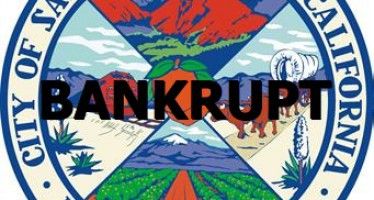Union Anti-Bankruptcy Bill Rises Again
AUGUST 24, 2010
By KATY GRIMES
Instead of allowing cities or municipalities to make the difficult decision whether to file for bankruptcy, a bill is being heard again in the Senate that would provide that a local public entity may only file under federal bankruptcy law with the approval of the California Debt and Investment Advisory Commission, a nine-member appointed commission under the state treasurer, Bill Lockyer.
The Commission, through AB155, a union-backed bill authored by Assemblyman Tony Mendoza, D-Artesia, would be able to prevent financially destitute California cities from filing for federal bankruptcy protection under Chapter 9 of the bankruptcy code.
Proponents have packaged this proposal as a “good government bill” to guard against unjustified bankruptcies which could affect credit ratings and raise borrowing costs for other local agencies as well as the state.
Opponents say that the real goal is to protect labor unions’ contracts with cities, counties and special districts. The bill attempts this by requiring any local agency considering bankruptcy to first get permission from the commission — dominated by union-friendly Democrats, according to bill opponents — before seeking bankruptcy protection.
The bill was surprisingly removed last week from the Senate Inactive File and given new life by Sen. Mark DeSaulnier, D-Contra Costa, and was heard again in the Senate Local Government committee Tuesday before heading back to the Senate.
The inactive file is where the the bill ends up after the Third Reading File, and cannot be taken up without a two-day notice. While this may put a bill on hold, when the proponents think the time is right, the bill is taken off the inactive file and sent back to the Senate or Assembly.
The commission could make cities keep all labor contracts in tact, as a condition of a bankruptcy filing, virtually nullifying the need for bankruptcy.
The bill has been amended to create an alternative procedure for a local public entities to petition and exercise powers pursuant to federal bankruptcy law. Under the “alternative process,” a local public entity must also submit information to the state auditor describing the public entity’s current financial position, including analysis of:
- The local public entity’s petition to exercise powers pursuant to applicable federal bankruptcy law.
- The local public entity’s ability to pay its undisputed debts.
- The options that the local public entity has considered to avoid seeking relief.
- The local public entity’s plan for restoring the soundness of its financial position.
- An itemized list of creditors that may be impaired to may seek damages as a result of the proposed plan.
Dan Carrigg, the legislative director for the League of California Cities spoke in opposition to the bill in the senate local government committee Tuesday, and criticized the lack of a commitment to the time allowed by the state auditor to make an analysis of a city’s financial condition.
The league has been opposing the bill for more than two years according to Carrigg, who said that in its current form, even with amendments, the bill still has league opposition. Questioning why a commission is needed, Carrigg said that a bankruptcy judge has the authority to issue an automatic stay for the city seeking relief under the bankruptcy code, and acknowledged that bankruptcy is the last possible option a city would seek.
The list of opposition to the bill numbers more than 64 municipalities, the California Chamber of Commerce, the Howard Jarvis Taxpayer Association and nearly every city and town in the state.
Support for the bill comes from more than 50 public employee and labor unions in the state including AFL-CIO, the California State Employees Association, the Service Employees International Union, the AARP, the International Longshore and Warehouse Union as well as the California State Treasurer, Bill Lockyer, whose agency oversees the California Debt and Investment Advisory Commission.
One Capitol source said, “Simply put, AB155 undermines the principal benefits of federal bankruptcy: the automatic stay of financial obligations and time to allow a debtor some ‘breathing space’ to formulate a debt readjustment plan. And limiting financially-stressed agencies’ flexibility to address their primary expense — personnel costs — would set perverse policy.”
DeSaulnier said that the bill went on the inactive list until the idea of the auditor’s involvement was complete. “We want to allow the municipality the ability to discuss going to the auditor in a closed session,” said DeSaulnier, concerned that public discussion by officials of a city or municipality about bankruptcy, could be permanently detrimental.
The local government committee voted 3-1 to send the bill back to the senate.
Read my last story about AB 155: Union bill would block city bankruptcies
Related Articles
San Bernardino bankruptcy shows pensions crowding out services
In his novel “The Sun Also Rises,” California novelist Ernest Hemingway wrote, “How do you go bankrupt? Two ways: Gradually,
Fracking with no freshwater — or water — increasingly common
The next great environmental fight in California is likely to be over hydraulic fracturing, the energy extraction process that uses
State Board Loans State Dept Money
Dec. 17, 2010 By KATY GRIMES On Dec. 15, a state investment fund loaned more than a million dollars to




